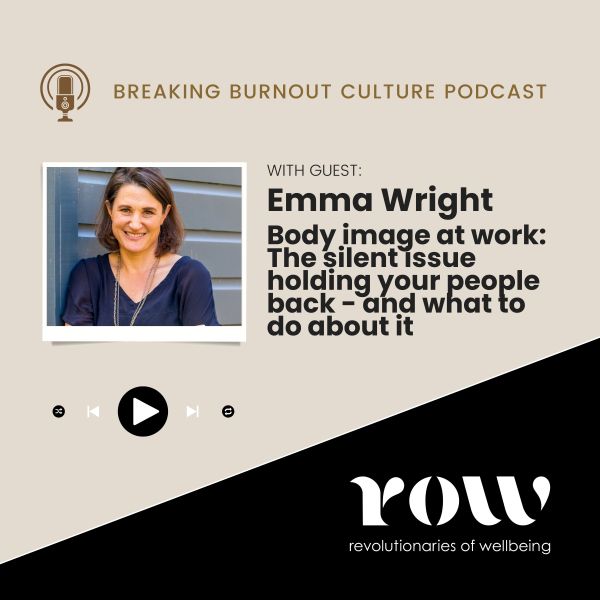When it comes to wellbeing at work, body image isn’t often (ever?) at the top of the priority list. Yet, it can have a profound impact on how people perceive themselves and their abilities in the workplace.
Our relationship with our bodies doesn’t stay at home when we go to work. It comes with us and can affect our confidence, willingness to contribute and speak up, and ultimately, our career growth.
Years of research have linked body image to factors such as self-esteem and mental health. Emerging research has linked it to workplace factors like job satisfaction and social engagement.
In this episode, we’re joined by advocate, speaker, and coach Emma Wright to discuss body image, its impact on work, and differences between genders and cultures. We’ll also discuss practical steps organisations can take to support healthy body image discussions and reduce harm, and the steps we can all take to foster a healthy body image for the next generation.
This is an important conversation – and one that’s long overdue.
“People who feel unsafe in their bodies will not speak up at work because it literally feels unsafe to speak up in a situation where you think other people are judging you by how you look.”
– Emma Wright
Listen on your favourite platform
Discover the ROW Workplace Wellbeing Podcast on popular platforms such as Spotify, Apple, Amazon Music/Audible and iHeartRadio.
We value your feedback! Please consider leaving a review on your preferred podcast platform, such as Apple Podcasts or Spotify. Let us know what you enjoyed most about this episode.
Episode insights
Episode Summary
Key points
This episode covers how:
- Body image significantly impacts workplace performance and confidence
- 80% of women experience negative body thoughts daily
- Weight bias has increased over the past 20 years, unlike other biases
- Body image issues affect both men and women, though in different ways
- Social media and cultural expectations contribute to body image concerns
Detailed summary
1. Introduction (00:04 – 01:27)
Sarah introduces the topic of body image at work, highlighting its often-overlooked importance in workplace wellbeing. She emphasises how body image affects confidence, willingness to contribute, and career growth.
2. Emma Wright’s background (01:27 – 05:34)
Emma shares her personal journey with eating disorders and how it led to her current work. She discusses her research into creating good body image in young people and her transition to coaching women on improving their relationship with food and their bodies.
3. Understanding body image (06:04 – 07:25)
Emma defines body image as comprising four aspects:
• How we see ourselves
• How we think about our bodies
• How we feel about our bodies
• How we behave towards our bodies
4. Gender differences in body image (07:25 – 14:32)
The discussion covers how body image issues affect both women and men, noting that while historically more focused on women, men are increasingly experiencing similar pressures. Emma highlights the rise of eating disorders among men and the impact of ‘bro culture’ on male body image.
5. Impact on workplace behaviour (14:32 – 20:36)
Emma explains how poor body image can affect workplace behaviour, including:
• Reluctance to speak up
• People-pleasing behaviour
• Black and white thinking
She emphasises that feeling unsafe in one’s body can significantly impact professional performance and psychological safety at work.
6. Workplace approaches to body image (21:17 – 30:03)
The conversation shifts to how workplaces can address body image issues:
• Assuming body image issues exist within the workplace
• Considering how workplace culture might perpetuate these issues
• Potentially implementing policies on how bodies are discussed at work
• Using storytelling to create awareness and empathy
7. Generational differences (35:23 – 37:31)
Emma discusses how younger generations, particularly Generation Z, are more mentally health literate but also face increased pressures due to social media.
8. Parenting and body image (38:58 – 44:05)
The discussion touches on how parents can support children in developing a healthy body image, emphasising the importance of demonstrating healthy attitudes and open communication.
9. Workplace wellness initiatives (44:43 – 46:59)
Emma critiques common workplace wellness initiatives, particularly fitness challenges, noting they often benefit those who already feel good about their bodies while disadvantaging others.
10. Tips for improving body image in the workplace (47:01 – 50:53)
Emma provides three main tips:
1. For leaders: Keep body and food talk out of the workplace
2. For leaders and individuals: Create body safety in the workplace
3. For individuals: Notice how much mental space body and food thoughts occupy and work on reclaiming that power
Additional notes:
- Wright’s personal experience with an eating disorder influenced her current work in body image advocacy
- The discussion touches on the impact of body image issues on various life stages, from childhood to menopause
- There’s a noted lack of research and case studies on body image initiatives in workplace settings
- The conversation emphasises the universal nature of body image concerns, with nearly everyone experiencing some form of body dissatisfaction
APPLYING THIS TO THE WORKPLACE
If you’re thinking about how to apply this to your workplace, here are some things to consider.
The business case:
- Employees who feel comfortable in their bodies are more likely to speak up and contribute.
- Reducing negative body thoughts frees up mental energy for work.
- Eliminating harmful body-related comments creates a more supportive environment.
- A workplace that welcomes all body types fosters true belonging.
- Addressing body image concerns can help lower disordered eating behaviours.
- Younger generations expect workplaces to be mindful of body image issues.
- Fitness challenges and appearance-based initiatives can unintentionally exclude employees.
- Complimenting contributions rather than appearance fosters a safer space.
- Creating a body-safe environment improves overall wellbeing and job satisfaction.
- A healthier, more engaged workforce leads to better performance and retention.
Potential challenges to address:
- Body image is not often a priority in workplace wellbeing initiatives.
- Lack of research on body image in the workplace context.
- Cultural stigma against people in bigger bodies has increased over the last 20 years.
- Unintended negative impacts from well-meaning wellness initiatives.
- Resistance to change from older generations.
- Continued societal pressure and unrealistic body standards.
- Potential for increased eating disorders and body image issues in younger generations.
Top tips for listeners:
- Create a workplace culture that avoids commenting on bodies or appearance.
- Implement anonymous feedback systems for staff to report body-related concerns.
- Offer opt-in/opt-out options for wellness programs to allow consent.
- Review workplace messaging to ensure it promotes self-worth beyond appearance.
- Encourage leaders to share personal experiences with body image.










